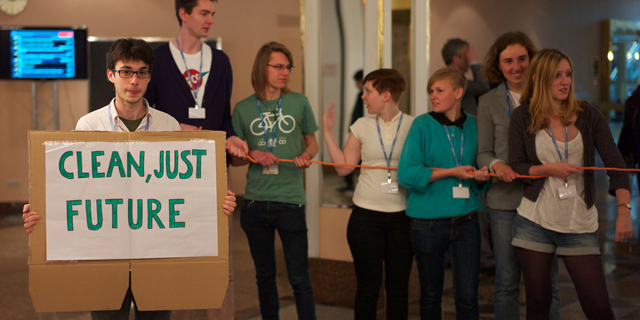by Jamie Gorman, Young Friends of the Earth Ireland @JamieCGorman
At the UN climate talks which are taking place in Bonn, the shift towards abandoning the principle of common but differentiated responsibility is subtle, but its impact will have a huge impact on ensuring social and environmental justice for those most affected by climate change.
The EU’s major role in supporting this shift-while acting as the hero captain steering the negotiation’s ship – is the equivalent of wishing someone ‘Bonn’ chance as you throw them overboard without a lifejacket. And for many countries of the South facing rising sea levels, this metaphor is dangerously close to becoming a deadly reality.
The principle of common but differentiated responsibility, established under Kyoto, meant that all signatories agreed to share responsibility for reducing emissions- but crucially recognised that because not every country was equally responsible for pollution, not everyone should pay the same price. In particular this recognised that the countries of the Global North have a clear moral and historic responsibility to reduce emissions as the chief causers and benefactors of pollution.
Now though, as negotiations begin to replace Kyoto by a new treaty to be signed in 2015, the EU is seeking to force the Global South to pay more for emissions, while Big Business in the EU and throughout the Global North will continue to profit from the turning of carbon into capital through EU backed market mechanisms.
EU climate commissioner Connie Hedegaard has sought to justify the renegotiation of common but differentiated responsibility by saying that ‘countries have recognised that the old division between developed and developing countries – there are limits to how useful that is in the 21st century.’
Certainly the world has changed since 1990, the year on which emissions targets have been calculated, but the divisions between so called ‘developed’ and ‘developing’ countries have only widened. Northern governments and companies, enthusiastically led by the World Bank and International Monetary Fund have worked hard over the past twenty years at imposing neo-liberal economic solutions on the South.
We now have a situation where neo-liberal capitalism has taken the climate crisis- once a powerful challenge to the unsustainable and unjust practices of big business- and turned it into a opportunity to profit, with ‘market mechanisms’ such as the Clean Development Mechanism seen as the only way forward, when in reality it is an ‘alternative’ which only means business as usual for polluters.
Last week’s disagreement between the EU and its negotiating partners from the Least Developed Countries and the Alliance of Small Island States on the commitment period for ‘Kyoto 2’ has exposed some of the tensions in this relationship. We need to continue to push to ensure that the EU captains the ship to a safe and just harbour, and doesn’t dump its Southern partners as soon as it’s made the seas safe for business.
If we want the EU to take a stand for a just and equitable outcome to the next Conference of Parties in Qatar later this year, then we need to continue to remind them that heroes need integrity; they can’t say one thing and do another.
—
Jamie Gorman is a campaigner at Young Friends of the Earth Ireland

